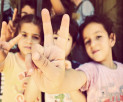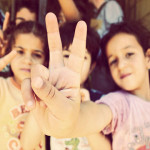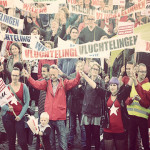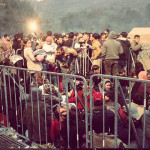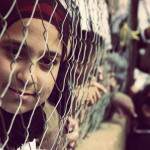Guardian for young asylum seekers
It should come as no surprise that Margrite Kalverboer was one of two nominees for the position of Children’s Ombudsman. Just like the man whose job she is taking over – Marc Dullaert, who became Children’s Ombudsman in 2011 – her career has been dedicated to the legal position and protection of children from both within and beyond the university.
But they share an even greater personal and professional cause: the safety and well being of child refugees.
Refugees
Long before the current exodus from Syria to Europe began, Kalverboer was already working with children whose families had fled their home country. It was more than a decade ago that she initially met a Syrian child who strongly impacted not only her career path but Dutch law as well.
‘We were really pioneering in that sense’
Their meeting was purely coincidental: Kalverboer’s in laws lived on Terschelling, and among the residents of an asylum seeker’s centre located on the island lived one Syrian family with several children. ‘Their oldest son was eager to study at university. He was 10 or 11 years old when he came to the Netherlands’, he says.
The young man was an excellent student. ‘He passed his final exams in one go and wanted to go on to pharmacy school.’ But he couldn’t go.
Curriculum vitae
Margrite Kalverboer achieved her PhD at the RUG in 1996 for research into the Child Care and Protection Board’s reports on extreme problem cases in child rearing and childcare. Following her defense, she worked as a behavioural scientist at the youth detention centre Het Poortje. In 2007, she became a lawyer with a specialisation in children’s rights and since then, she has been doing research into developments and the legal position of children with regard to civil rights, the juvenile justice system and, in particular, refugee law. In 2012, Kalverboer was named an endowed professor at the Faculty of Behavioural and Social Sciences (BSS) by Stichting Nidos, a foundation for the protection of young refugees.
Accountability
‘If you don’t have official status of any kind, then it is difficult to go to university’, Kalverboer explains. ‘He had applied for a grant from the UAF (Foundation for Refugee Students, ed.), but that was denied.’ The IND doubted his father’s story of how they fled Syria – at the time, the situation there was more stable – and that decision was also applied to his son’s grant application.
Kalverboer felt that it was deeply unfair. Together with her own father, former RUG psychology professor Alex Kalverboer, Margrite filed an appeal in order to draw attention to the young Syrian’s case. ‘We felt that children could not be held accountable for their parents’ situation’, she says. ‘And on the basis of taking that step, the policy was also changed.’
Living conditions
Her work for refugee children didn’t stop there. In collaboration with her colleague Elianne Zijlstra, she created a questionnaire for lawyers who work with asylum seekers. The list would serve as a tool which could help them assess if the living conditions in the camps are suitable children’s development.
Initially, there was little interest among attorneys for the initiative. ‘Virtually no one cared about it. Seriously. No one, except for one lawyer from Leeuwarden, was eager to take it on’, she recalls. ‘Before that time, everyone said, ‘There’s no point because children’s rights do not count for foreigners, so we won’t look into it.’ We were really pioneering in that sense. I believe we have about 50 families on the waiting list nowadays.’
Lumping together
The explosive growth of the refugee population in the Netherlands likely plays a role in just how long the list is nowadays. When the influx of refugees (1,800 per week) and media attention reached its peak in the Netherlands in September, concurrent with several high profile cases of children facing deportation, Kalverboer felt that the national discussion was sorely lacking nuance.
‘For them, there is no ‘going back’’
Refugees, asylum seekers, migrants, foreigners, immigrants: many groups were simply lumped together. For someone to officially have refugee status, the threat of persecution must be present, ‘for example based upon one’s political background. Asylum is more connected to the general situation in their home country, such as ongoing war that is impacting everyone or at least the vast majority of the population. The tricky thing about asylum is that you get a residency permit for a limited period of time. Nearly everyone who is coming here now from Syria is being granted a residency permit on grounds of asylum, or very nearly everyone. On the other hand, that means in principle that when a country is once again safe, you have to go back.’
‘There is no ‘going back’’
But such a policy doesn’t take into account the reality of the situation for the children of asylum seekers. ‘For them, there is no ‘going back’, Kalverboer says. ‘That is no longer what they associate with ‘going back’. They have little to no knowledge of the country, or they don’t feel any cultural connection to it.’
‘In such cases, it really has to be a matter of absolute necessity or present a serious improvement of their situation if you are considering moving them somewhere but the children are saying. ‘I don’t want to go.’ Those are not strange risks to consider, and you see it all the time. The longer that they are here, the more the children and parents differ from each other.’
‘As Dutch as Limburger vlaai’
That also counts for their sense of national identity and the extent to which children feel they are truly accepted in Dutch society, she says. ‘Children do their very best in order to fit into Dutch culture. It really bothered me in cases like Mauro and the other children who have been allowed to stay. People have said things like, ‘they have to prove that they’re Dutch, just as Dutch as Limburger vlaai.’ Just as Dutch as can be. But I think they have a right to their own identity and to remain connected to their background. You don’t have to completely change yourself in order to stay here.’
This article is based on an interview from September 2015.


